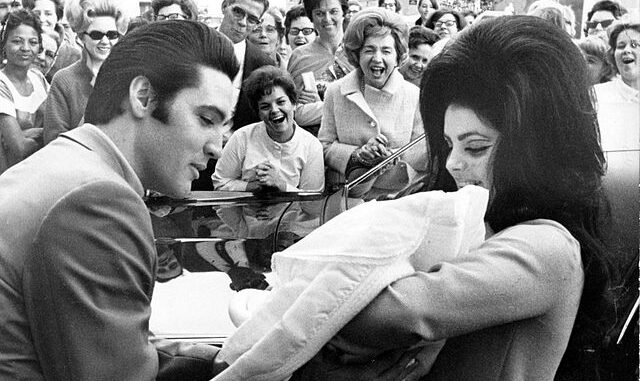
Tristan Hasseman | Staff Writer
Often overshadowed by the grandeur and eventual demise of her ex-husband, Priscilla Presley has long carried on Elvis’ legacy with an inspiring poise. However, the time has arrived for her perspective to be shared with the world. Based on the Presleys’ autobiography “Elvis and Me,” the film “Priscilla” is a poignantly honest film by acclaimed director Sofia Coppola and executively produced by Presley herself.
Opening on an Air Force base in West Germany 1959, “Priscilla” chronicles the relationship of Priscilla and Elvis Presley from the time she was a ninth-grade schoolgirl to their separation in 1973. As their relationship blossomed, a lonely girl connected with a lonely boy despite their age difference and the aggressive stardom attached to the pair. Their instant bond sparked an unparalleled story of life and love.
Caillee Spaeny effortlessly portrays Priscilla with extreme grace alongside Jacob Elordi who adds another controlling and corrosive character to his growing resume with his portrayal of Elvis Presley.
“Spaeny may be in her mid-20s, but she’s impressively, and eerily, convincing in the role of adolescent Priscilla,” said reporter Aisha Harris of NPR.
Spaeny’s performance evolved throughout the film to reflect the couple’s changing 14-year relationship with increasing depth. Elvis’ slow descent into madness and addiction presented a personal perspective in “Priscilla” that was kept hidden from the general public at the time, but one that is necessary to understanding Priscilla’s motives for parting ways.
Meanwhile, Elordi’s take on Elvis Presley is more brooding and thoughtful than previous depictions, which focused more on his commercial success than his emotional unpredictability.
Peripheral prop work was an important element that allowed the film to be so personal and attentive to detail. The watches, hair spray, curlers and perfumes that to many would seem insignificant or unnecessary are essential to understanding life in that era. Coppola captured the importance of innocence in youth and the naivety of our formative years, branded by what we wore and the things that were important to us. Some of the most powerful moments of the film were the ones that highlighted the items that shaped her identity as both a woman in the 60s and the wife of a legend.
Her appearance was the only thing Priscilla had control over in her life, but she found that even then Elvis’s expectations often weighed heavy upon her. The plethora of material belongings that surrounded Priscilla’s character throughout the film showcased her desire for control over part of her life.
It is important to understand that “Priscilla” is not a traditional biopic but more so a film about the impact of love and its evolution over time. As the executive producer of an autobiographical movie, Presley focused on the key moments throughout her relationship that shaped her both personally and socially as a woman, a wife and a young person facing the scrutiny of the public eye.
Coppola crafted a visually stunning film that succeeded through its simplicity and attention to detail. The cool tones and pastel palette reflected Presley’s mood and changing emotions. During the scenes without Elvis, the colors were bland and dark; when the superstar was in the room with Priscilla, the colors were more vibrant and exciting. The quiet beauty of the visuals reflect the natural beauty that Priscilla maintained throughout the times of comfort and chaos.
The shift in visual techniques throughout the movie brought a breath of fresh air to the often brooding plot, but it wasn’t always enough to break up the slow ruts that the movie occasionally fell into.
Earlier in the year, Baz Luhrmann directed “Elvis,” a gloriously dazzling film displaying the highs and lows of stardom and fame. The complete opposite of “Priscilla,” Luhrmann’s film embodies the glamorous energy that “Elvis” brought to the world while “Priscilla” uncovers the sad and often unpredictable highs and lows of living with the King.
The contrast works favorably and together the films are complementary rather than conflicting. A double feature of both films should almost be required so that the audience can best understand the differing perspectives of such a scrutinized marriage.
As the movie draws to a close, Priscilla Presley realized her role as a mother is “queen,” and she embraced her newfound independence. The final scene is the most touching as Priscilla left Graceland, the place she called home for ten years.
As she drove away to “I Will Always Love You” by Dolly Parton, her wistful smile and emotional eyes expressed that bittersweet feeling that occurs when one chapter of your life closes and you’re faced with a fresh but uncontrollable future.
Elegant and inviting, “Priscilla” is a touching, emotional powerhouse that keeps audiences thoughtfully engaged in the history of the Presleys long after the end credits.
